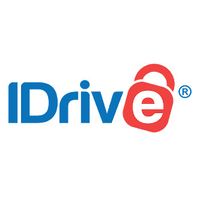The best cloud storage for photos: online storage for photographers
Keep your images and videos backed up and accessible with the best cloud storage providers

When you're choosing the best cloud storage for photos, there are a few things you need to consider. Are you just looking to store your holiday snaps in a central location? Or are you a serious photographer who needs to both RAW files and quickly share images with clients? Depending on your needs, deciding on the best cloud storage for photos will be different for each person.
Some will be happy with a free service that provides limited amounts of storage. For others, upgrading to a paid cloud storage service will be a better option, giving you more storage, and more advanced features as well as peace of mind.
While the best portable hard drives are great, there's nothing that beats the peace-of-mind that the best cloud storage for photos gives you. After all, a service such as Dropbox or iCloud can't be dropped, knocked, or destroyed in a fire! While the most foolproof system would be to combine cloud storage with a password manager service and place the same images on a product such as a portable SSD, you still get plenty of data security with cloud storage alone.
You'll want to look for a single, easily accessible online archive that can be viewed, uploaded to, and downloaded from at any time, from camera phones, laptops, and tablets.
We've rounded up the best cloud storage for photos below. However, before you get into that, check out the three deals below to save your cash on some of the best cloud storage services around.
Top 3 best cloud storage deals
Why you can trust Digital Camera World
IDrive One-year 10TB plan| was $79.50 | now $3.98
95% off - You can grab a year's worth of 10TB, normally costing just under $80, for just $3.98! IDrive is our pick as the best cloud storage service for your photos and files available today.
pCloud | Lifetime subscription | less than $4 a month
If you're looking for the best cloud storage at a guaranteed low price long term, we recommend pCloud. Prices start at just $3.99/£3.59 a month, and you get a whopping 500GB of space for all your files. There are some tempting lifetime deals too, for those wanting a long-term archival solution.
ExpressVPN | was $12.95/mo | now $6.67/mo
Get 3 months free! This is a left-field way of getting cloud storage. VPN provider ExpresssVPN has teamed up with trusted cloud storage service BackBlaze to give one whole year of unlimited secure backup. There's a no-hassle 30-day money-back guarantee, a massive 49% discount off suggested retail price, AND 15 months for the price of 12.
Best cloud storage for photos
Paid online photo storage


Specifications
Reasons to buy
Reasons to avoid
IDrive is a fast, easy-to-use cloud storage solution that lets you easily sync files stored on your computer, as well as on a NAS (Network Attached Storage) drive. The simple web interface allows you to easily share files by email or to social media sites, and you can sleep easy knowing up to 30 previous versions of all files are retained should you need to roll back to an older version of an image.
What's more, while there is support for continuous file syncing, files on the cloud don't have to be automatically deleted should you delete the version on your local hard drive. Like Google Drive and Microsoft OneDrive, IDrive also offers a clever facial recognition feature to help you organize your image portfolio, and it's able to sync images across your mobile devices.
Read our full iDrive review for more details

Specifications
Reasons to buy
Reasons to avoid
If you're after a simple and convenient way to keep your images backed up, or just free up some space on your phone or tablet, Amazon Photos makes a strong case for itself. By offering completely unlimited storage capacity for original quality, full-resolution compressed and raw images, it immediately outguns many rival cloud image storage solutions. If you've already got a Prime membership, it's a complete no-brainer - use Amazon Photos!
If you don't already have Prime, the cost of a Prime membership just to get Amazon Photos isn't a bad value, but you should also consider other cloud storage providers.
To sum up: if you just want to store a ton of images at original quality, Amazon Photos is great, provided you already have a Prime membership, or will use other Prime services like Prime Video to help justify the cost. But if you want to store videos or other files, signing up for a conventional cloud storage provider will offer better value.
Read our full Amazon Photos review for more details

3. pCloud
Specifications
Reasons to buy
Reasons to avoid
pCloud is a relative newcomer to the cloud storage scene, but it's making waves, and it's easy to see why. This is one of a few cloud storage companies to offer a one-off, lifetime payment option, as well as annual subscription plans.
It's not only the lifetime option that makes pCloud attractive, though. You can access your files from a PC, Mac, mobile devices, or the web, with pCloud appearing as a local drive on a PC or Mac for ultimate ease of access and backup. What's more, for a small extra monthly payment, you can upgrade to pCloud Crypto so each stored file can be encrypted and password protected.
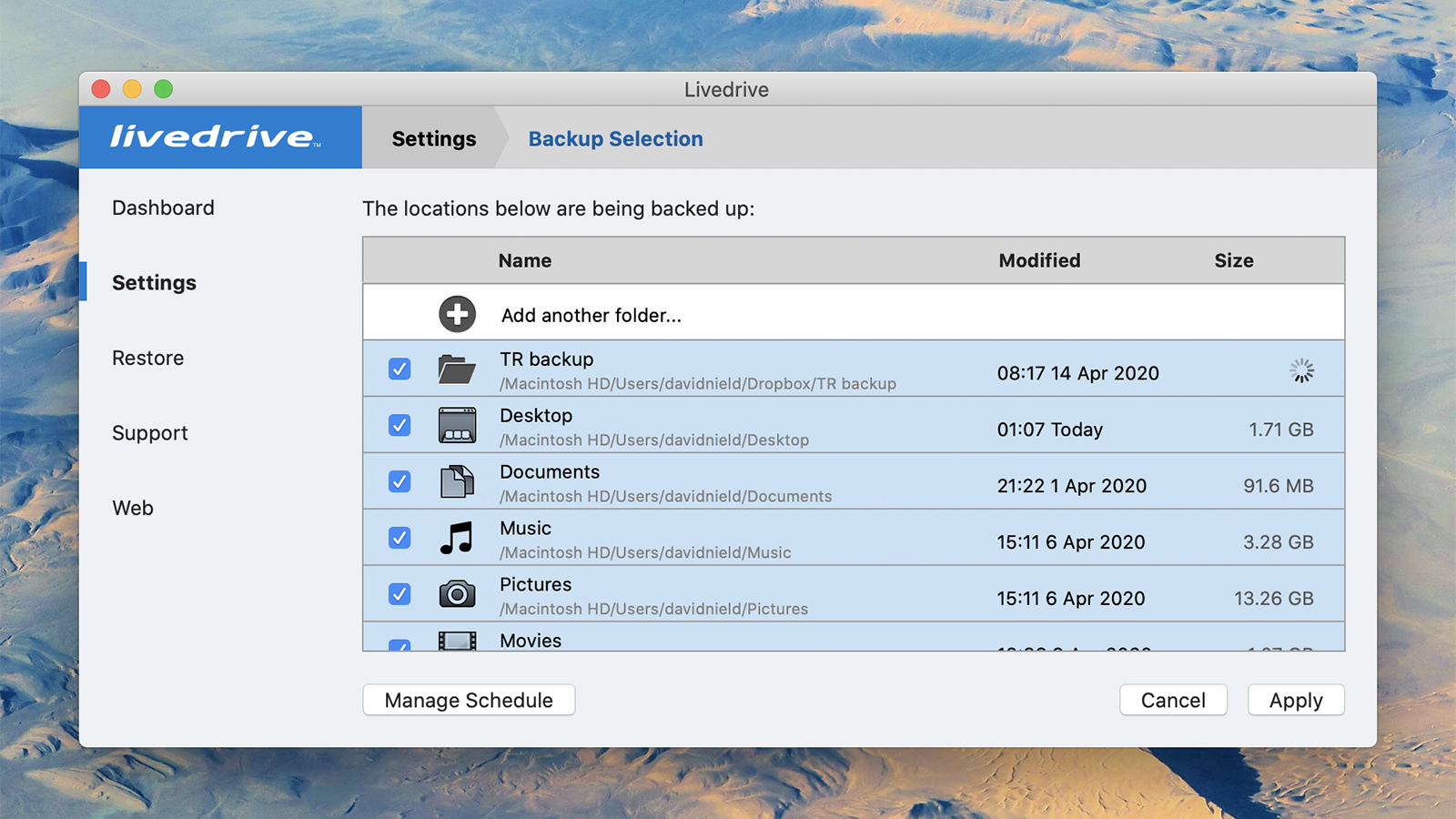
4. Livedrive
Specifications
Reasons to buy
Reasons to avoid
Livedrive is unusual among cloud storage providers as it offers unlimited capacity, and if you only need to back up the contents of one PC or Mac, the monthly cost is very reasonable. Back-up is automatic and mirrors any changes you make to a file on your computer, and up to 30 previous versions of edited files are stored in case you need to roll back to a previous file version.
To back up multiple computers (up to 5), the Pro Suite is the package to go for. This also lets you back up your mobile device, as well as giving you 5GB of Briefcase storage. Briefcase is Livedrive's file syncing service which functions much like Dropbox, giving you an online drive where you can store you're most-used images, videos, and documents for easy access while you're on the go from any computer or mobile device. Briefcase also makes it easy to share files and folders securely, with the option to password-protect a shared file.
Livedrive can be accessed via its website, or a dedicated app for Windows, macOS, iOS, and Android. Stored files are protected by AES-256-bit encryption, along with two-factor authentication when you access your account.
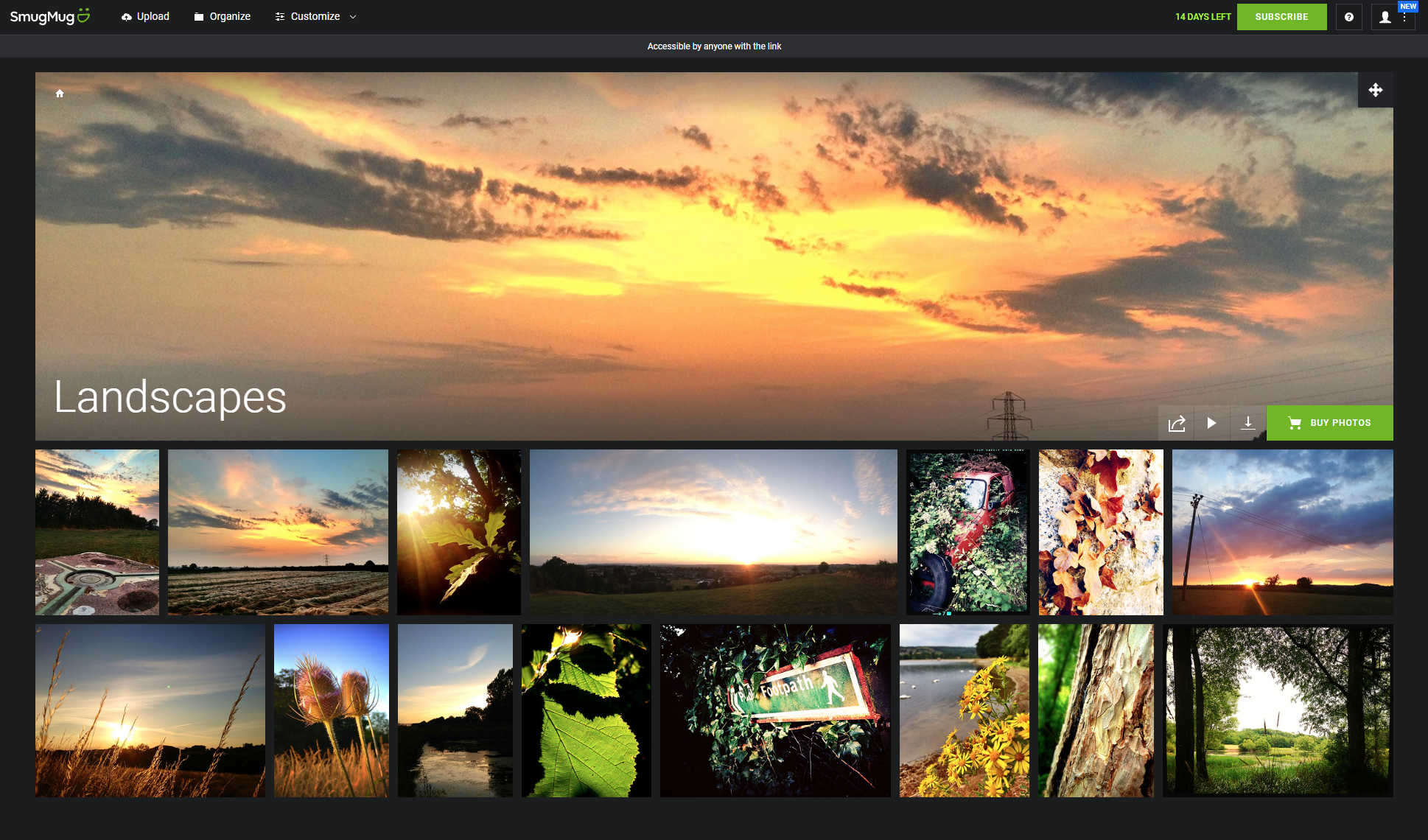
5. Smugmug
Specifications
Reasons to buy
Reasons to avoid
Smugmug isn't really cloud storage in the conventional backup sense - it's a website builder designed to host image and/or video content. Think Flickr (no coincidence - Smugmug acquired Flickr in 2018) but with a major overhaul and many more features.
The main draw here is you can upload unlimited numbers of images and videos, albeit with a few limitations. Images must be less than 150MB each, and videos need to be under 3GB, with a max res of 1080p and a duration of 20 minutes.
The other catch is that being a platform designed for displaying photos online, not just storing them, image file types are restricted to web-friendly JPEG, GIF, PNG, and HEIF formats; no Raw or TIFF support here. You do however get a mobile app that enables image editing and archiving on the move, while the display options for uploaded images and videos are extensive, as are the media-sharing features.
Four pricing options are available: the Basic plan gives you a simple but modern website design, but with restricted customization and a .smugmug.com website URL. Upgrading to the Power plan adds much more customization, including 21 web templates, right-click image protection, and a proper domain name. The Portfolio plan adds web store options so you can make some cash from your snaps. The topmost Pro plan is even more eCommerce focused, with extensive marketing, checkout, and stock inventory options: it's targeted at professional photographers.
All four plans can be discounted by around 30% if you buy annually rather than monthly. Smugmug is so advanced it really needs to be tried, and thankfully you can sign up for a no-commitment 14-day free trial to see everything it has to offer.
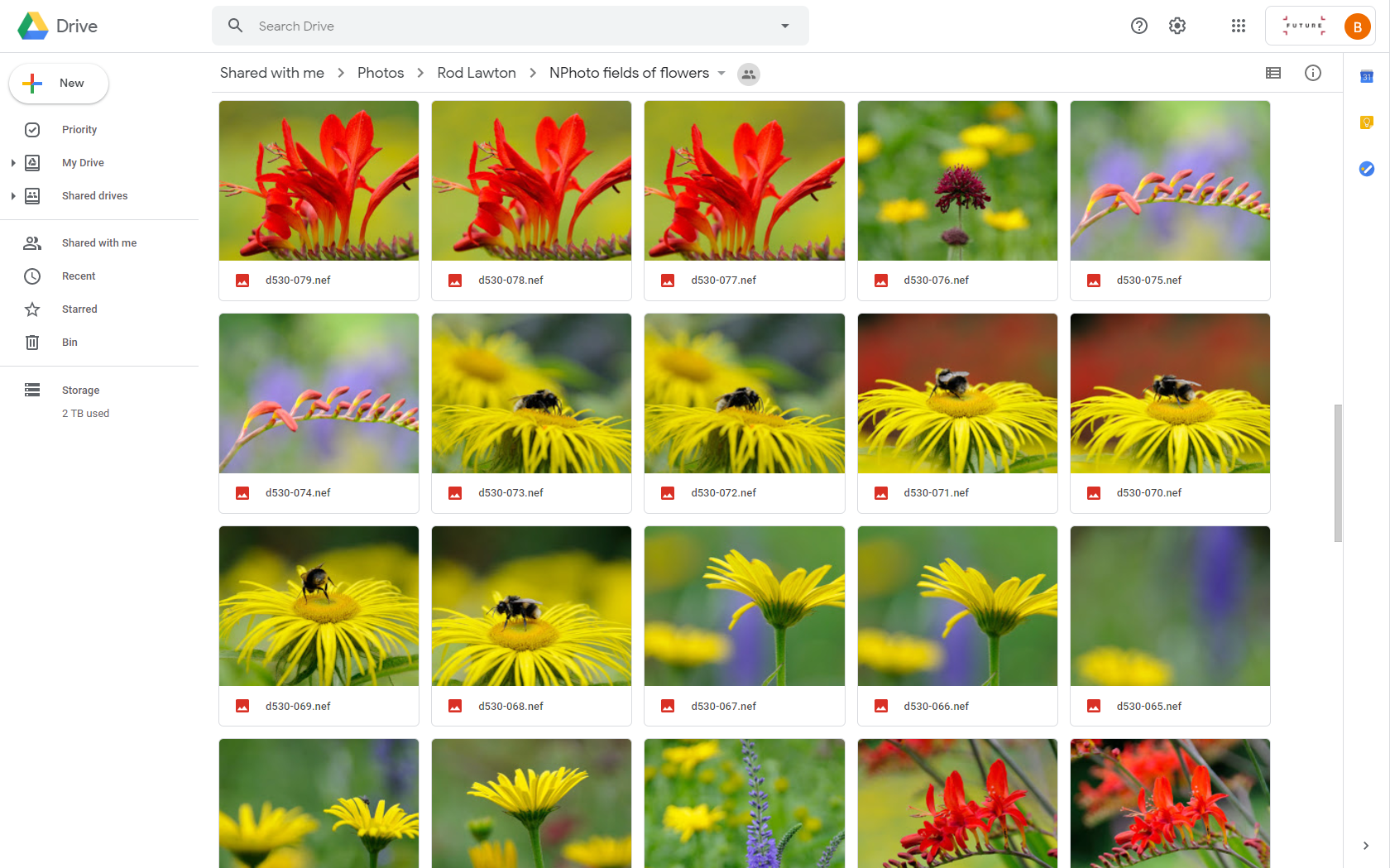
6. Google Drive
Specifications
Reasons to buy
Reasons to avoid
Google Drive is a service that enables you to store any file type and has a sliding pay scale depending on the services and the amount of capacity you want. You get a generous 15GB for free, but there’s also a wide selection of paid upgrades, for 100GB, 200GB and 2TB, depending on what you need. There are even 10, 20, and 30TB options, but they’re hugely expensive.
An added bonus is, like Apple and Microsoft, Drive isn’t just about storage, as it’s also integrated with Google’s cloud-based productivity apps that rival Microsoft’s Word, Excel and PowerPoint.

7. Dropbox
Specifications
Reasons to buy
Reasons to avoid
Dropbox has been the go-to cloud storage choice for years. You get a rather paltry 2GB for free, so really you’ll need to step up to the 2TB ‘Plus’ plan, which also gets you extras like easy file sending and a 30-day account and file recovery. A 3TB ‘Professional’ plan is also available, but it’s geared towards small businesses and isn’t great value for most photographers.
Dropbox’s simple interface enables you to drag and drop the files you want to store online into a Dropbox folder on your machine and then these are automatically stored in the cloud, mirroring what is on your device. If you delete a photo from your computer, it can be set to delete from the cloud. Using the mobile app for iOS and Android is equally easy.
Although Dropbox doesn’t offer a dedicated imaging application like iCloud Photos, the simple folder structure design will appeal to those who like to have full control over the way their files are stored and organized.
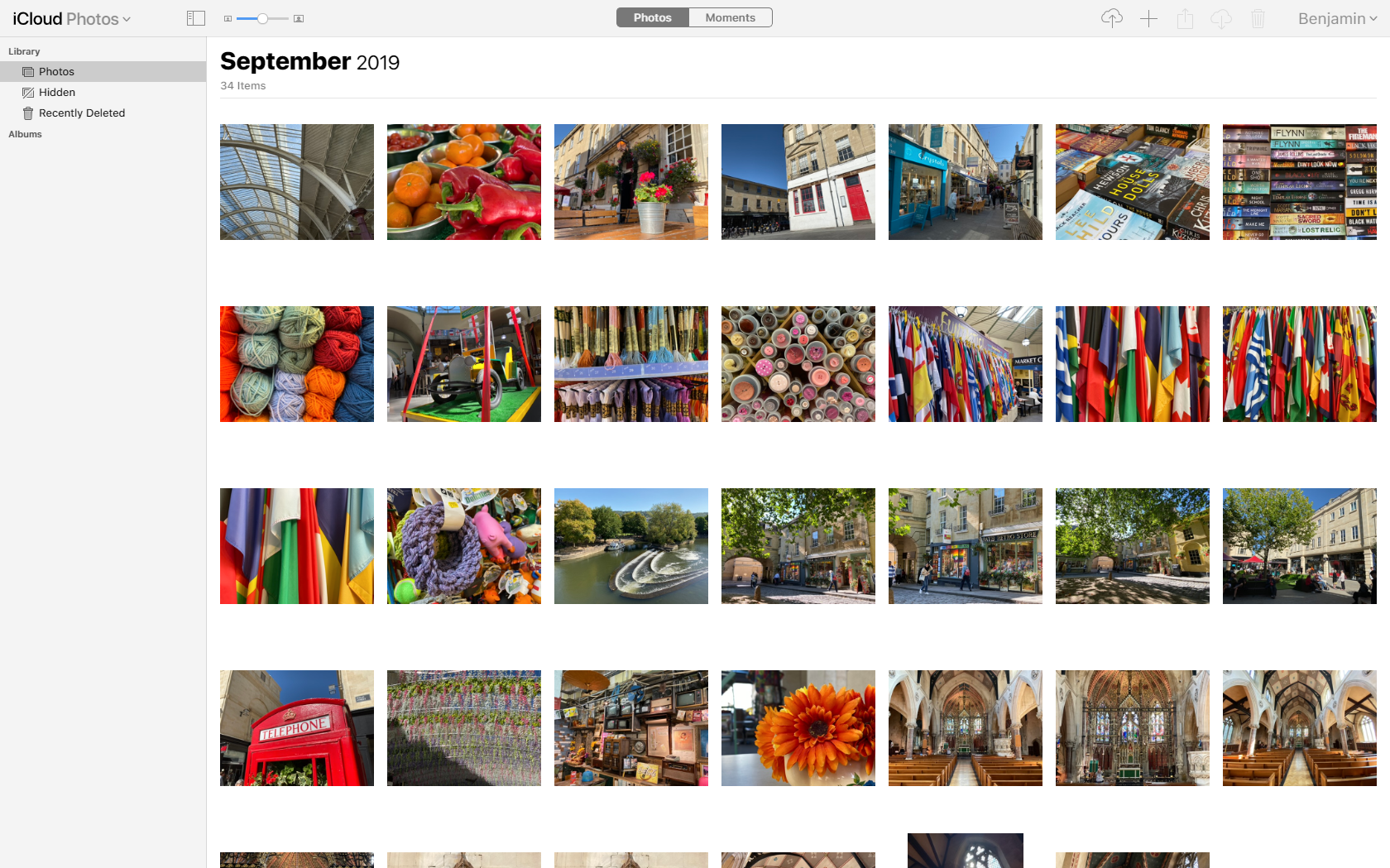
8. Apple iCloud
Specifications
Reasons to buy
Reasons to avoid
iCloud is the most logical cloud storage choice if you’re already an iPhone or Mac user, such is the seamless device integration of Apple’s ecosystem. iCloud's paid plans offer 50GB or 200GB of storage. You can also get 5GB for free when you sign up.
As with Microsoft Windows and OneDrive, iCloud is neatly integrated into the Mac Finder app, making for super-easy file backup and sharing across devices. The connection is so slick that selected folders on your Mac’s internal hard drive will automatically upload to iCloud, and if you delete a file from your machine, it’ll also be deleted from the cloud.
Apple also includes access to web versions of apps like Pages and Numbers for easier on-the-go productivity. The Photos app is available across Apple devices, as well as directly through a browser. It enables you to quickly access, organize, download, and share your images in one of the most streamlined interfaces available.

9. Microsoft OneDrive
Specifications
Reasons to buy
Reasons to avoid
Being a Microsoft product, OneDrive cloud storage is deeply integrated into Windows 10 so it can be accessed from the operating system much like a physical hard drive or SSD, making for an effortless cloud backup solution. There’s also a Mac OS app to enable a similar experience when using a Mac, though perhaps inevitably it’s not as slick as the iCloud ecosystem. OneDrive can also be used on iOS and Android mobile devices.
The photos section is just one part of OneDrive and it boasts clever features. There’s extensive raw file support, as well as the ability to automatically recognize the content of your images and tag them, making it easy to search for images by content or theme.
One Drive offers 5GB of storage for free, while there's a paid plan for 100 GB. Alternatively, a year’s subscription to the Microsoft 365 Personal plan gives you 1TB of storage, along with a useful file recovery service and access to online versions of Microsoft Word, Excel, and PowerPoint.
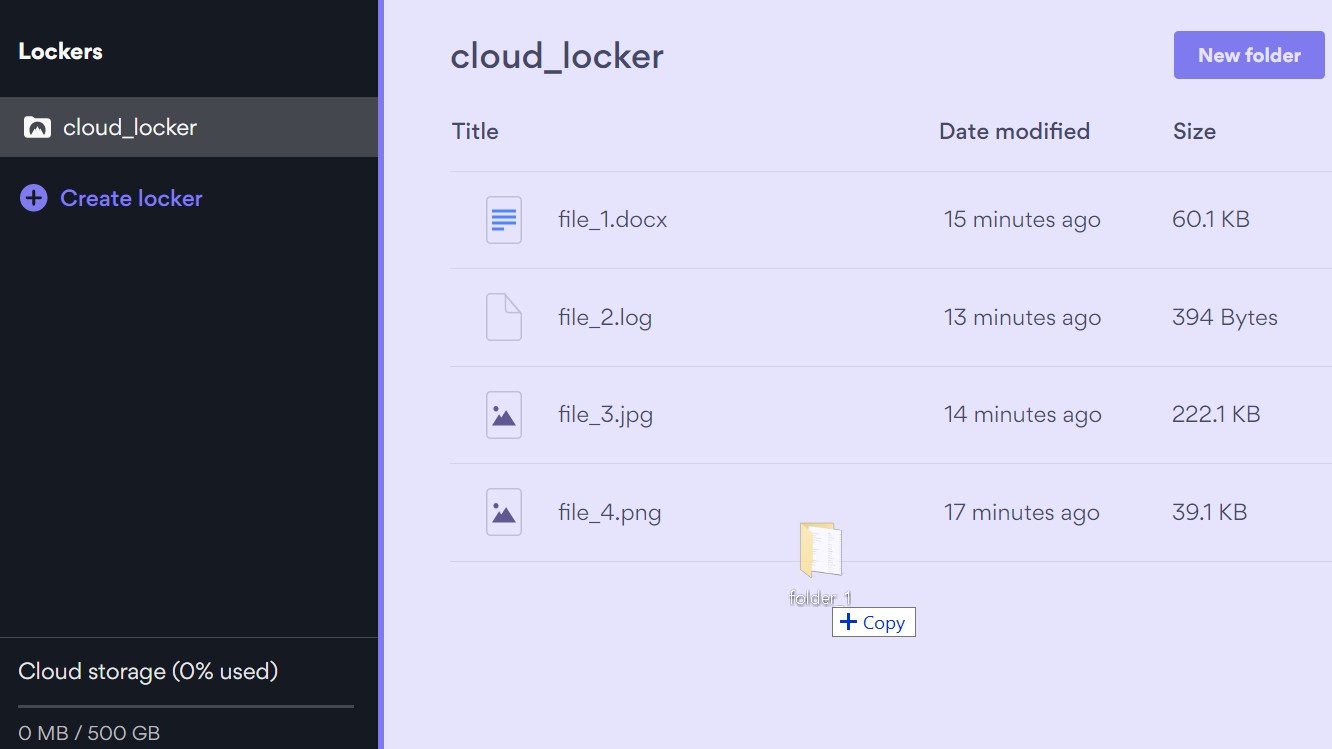
10. Nordlocker
Specifications
Reasons to buy
Reasons to avoid
Is the security of your images a big concern? Then we recommend NordLocker, which comes from the makers of NordVPN, one of the best VPNs for photographers. Privacy and security are a priority here, so all of your data is encrypted before you upload it for storage. That way, even the people who work at NordLocker can't see, access, or decrypt it.
Every NordLocker user has a unique encryption key. That means that even if you have multiple users on your computer, none of them can see or use your files (unless you share them).
Otherwise, it's a pretty simple service, with not much in the way of features. That could be a bad thing if you're looking for something specific, but for most people, it's a good thing because it makes the app very easy to use.
You get 3GB of storage for free, while the premium plans give you 500 GB. If you want more, though, you’ll have to contact NordLocker directly. At the time of writing, NordLocker is offering 60% off its normal pricing.
Free online photo storage
Free services usually come with strings attached, most obviously a severely restricted storage capacity. Only if you pay a monthly or annual subscription do you get to sample the best features and access more useful capacities.
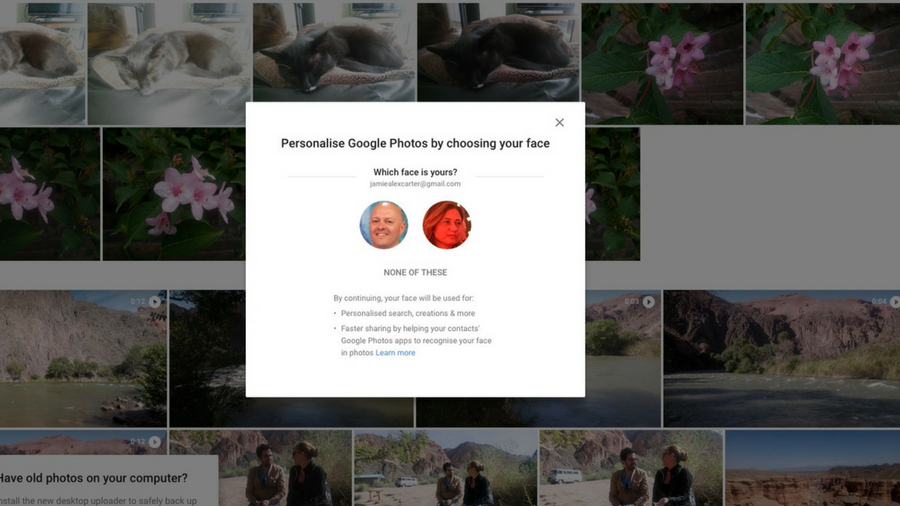
1. Google Photos
Reasons to buy
Reasons to avoid
This is the big one. As long as you agree with its restrictions on image quality, Google Photos will automatically upload and backup every photo you ever take on a smartphone (when it's on Wi-Fi), and extract every image it finds on your computer. What's more, it does it all for free.
However, there are a couple of catches; as it uploads your photos, it will downscale them to 16MP versions, and reduce any 4K videos it finds to Full HD 1080p quality. If that doesn't appeal, and you'd rather upload in maximum quality, that's OK with Google, but it will then restrict you to storing 15GB.
That's quite a downgrade from 'unlimited', but it's relatively generous. Still, even if Google Photos isn't perfect for professional photographers, it's still a pain-free way of backing up a phone and keeping a usable copy in the cloud of every photo you've ever taken.
Once everything has been uploaded – something that takes a while, obviously –Google Photos has all kinds of algorithms on board. Auto-enhancing, automatic tagging, and image recognition to find your face and group together anything with you. There's also an animation creator that will create occasional GIFs from burst sequences and slideshow video options too. Despite these playful features, Google Photos is genuinely impressive software. Plus, a mind-boggling 1.2 billion photos are uploaded to Google Photos each day, so algorithms will likely keep improving.
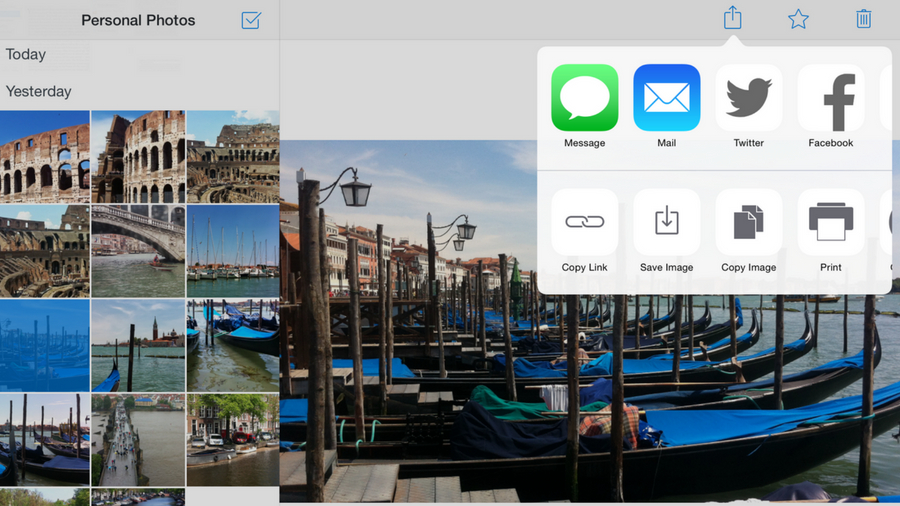
2. Dropbox Basic
Reasons to buy
Reasons to avoid
Though Dropbox is a rather simple cloud-based file storage service, it's particularly good for photos. Unfortunately, the free Basic version isn't much use since new users get a paltry 2GB of online storage – that's not going to stretch very far.
However, it's worth experimenting with if you're the type of photographer who likes to store all of their photos in folders on a computer and wants to keep it that way. Although it's a cloud storage solution, the Dropbox software installed on a desktop or laptop PC or Mac can be used to selectively sync folders.
Once it's set up, it's simply a case of dragging and dropping photos into a folder that will then automatically sync. It's great for syncing files and folders across several computers. The Dropbox app can then be used to view your photos on phones and tablets, though it's also got a camera upload option that auto-uploads all photos taken on devices.
If you want only the safety of a backup without ceding manual control of your photos, Dropbox is a pretty hassle-free solution for laptop/desktop PC/Mac users.

3. Degoo Cloud
Reasons to buy
Reasons to avoid
Degoo Cloud isn't the best-known cloud storage provider, but as it's designed specifically for photographers uploading from mobile devices, it's definitely worth a look. Particularly as you can get a generous 100GB of storage here for free, which dwarfs what you'll find elsewhere. Plus, if you click on the special link above at the time of writing, you'll get an extra 100GB for free during your first year.
Need even more than that? For each friend you invite to Degoo, you'll get an extra 5GB of space, and so in theory you can get up to 500GB for free (that's where the offer taps out). We also like how the interface is nice and simple to use.
The catch with the free version is that you can only upload photos from one device, and the interface is plastered with ads. You can remove these restrictions by upgrading to one of the paid options, which also means you can benefit from end-to-end encryption.
How to choose the best cloud storage
What features should I look for?
Some of the best cloud storage for photos have useful features, such as file management automation. This will use geotags and metadata to group your images together by location, the device it was taken with when it was shot, or even using facial recognition to group the photos by individual people. A service that enables you to effortlessly organize your images into albums is also worth looking out for as well.
Are there any downsides to cloud storage?
Being able to upload and download images is great, but you're massively dependent on how strong your internet connection is - if your home has a slow connection, yet you want to back-up many gigabytes-worth of RAW files, the experience could well be frustrating. Meanwhile, one of the biggest problems with online services is that there are no promises of permanency - if the service runs out of money tomorrow, it could disappear overnight, taking your files with it. This is why we would always recommend using a combination of physical drives and cloud storage.
Read more:
Best website builders for photographers
Best external hard drives for photographers
The best website builders for photographers
Best VPN
Get the Digital Camera World Newsletter
The best camera deals, reviews, product advice, and unmissable photography news, direct to your inbox!
Ben is the Imaging Labs manager, responsible for all the testing on Digital Camera World and across the entire photography portfolio at Future. Whether he's in the lab testing the sharpness of new lenses, the resolution of the latest image sensors, the zoom range of monster bridge cameras or even the latest camera phones, Ben is our go-to guy for technical insight. He's also the team's man-at-arms when it comes to camera bags, filters, memory cards, and all manner of camera accessories – his lab is a bit like the Batcave of photography! With years of experience trialling and testing kit, he's a human encyclopedia of benchmarks when it comes to recommending the best buys.
